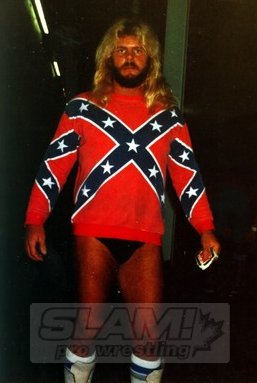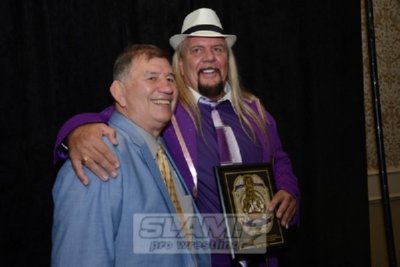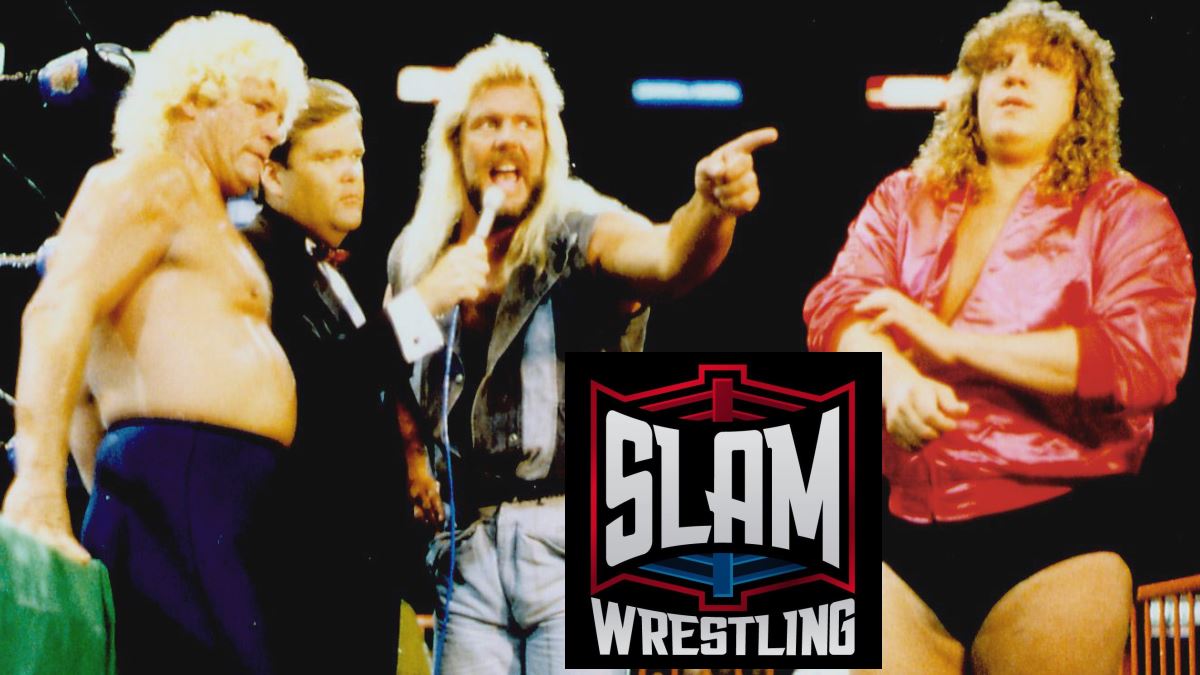In the 1980s, wrestling events in Texas were like rock concerts.

The always colourful Michael Hayes in his heyday. Photo courtesy Terry Dart.
And if ever World Class Championship Wrestling had a rock star, it was Michael “P.S.” Hayes, leader of the Fabulous Freebirds.
With his long mane of blonde hair, flashy robes, and rock and roll swagger, Hayes, along with Terry “Bam Bam” Gordy and Buddy “Jack” Roberts ushered in a new era in professional wrestling.
Earning their nefarious reputation around the world for their legendary rivalry and violent bloodbaths with the fabled Von Erich family, the Freebirds were instrumental in making World Class one of the hottest territories in the country.
Hayes was also a pioneer at this time, breaking down barriers and recording the song “Badstreet U.S.A.” for their entrance theme, making the Freebirds the first wrestlers to use original entrance music as they came through the curtain.
Highly influential and innovative, Hayes was awarded the Lou Thesz Award earlier this month at the Cauliflower Alley Club banquet in Las Vegas, Nevada. Just hours before the award presentation, Hayes chatted at length with SLAM! Wrestling.
Below is part one of our interview, in which Hayes discusses rock stardom, audience psychology, and some unsung heroes of wrestling.
Stay tuned to SLAM! Wrestling for part two, in which Hayes delves into wrestling’s former territorial system, the Legacy of the Freebirds, and Hayes’ life as a “classic artist.”
SLAM! Wrestling: First off, congratulations on receiving the Lou Thesz Award.

Jerry Brisco and Michael Hayes with his Lou Thesz Award. Photo by Brad McFarlin.
Michael Hayes: Well, thank you. Michael Hayes is getting the Lou Thesz Award, what an oxymoron that is. The greatest wrestler in the ring, I wasn’t (laughs). Lou is another story. And you know, I actually wrestled Lou Thesz when I was about 17 or 18 in a tin building outside of a drive-in in Meridian, Mississippi.
But you know, it’s a lifetime achievement award and I’m really humbled by it, I really am. And if people are thinking Michael Hayes humbled? (laughs) Yeah, I’m humbled. I’m gettin’ older and if there’s anything I can express to anyone out there it’s, this is not my award. This is the Freebirds award. This is Terry’s award. This is Buddy’s award. Without Terry and Buddy, and Jimmy Garvin in the later years, then Michael Hayes can’t be Michael Hayes. Yeah, Michael Hayes was the lead singer, yeah but he can’t play the keyboards and the drums and the bass and the rhythm section, he can’t do it all. You know, in a band the guy out front is usually the guy, but he’s nothing without the band, and that’s the same thing there with the Freebirds. And we all got our chances to shine, especially in World Class. So this is not my award, this is our award.
SLAM! Wrestling: Historian and writer Steve Johnson said his friend Dr. Tom Prichard calls you the David Lee Roth of wrestling — in a complimentary manner — as sort of the entrepreneur who created opportunities where none existed. Is that a reasonable analogy?
Michael Hayes: Yeah, it is. It really is. I kind of fancied myself that same way a long time ago. And speaking of Dr. Tom, I have known Dr. Tom for a long time and he’s a great guy. A funny guy, he’s got a little weird sense of humour, but if you know him he’s a really a good guy.
And speaking of music, I’ve got a new CD coming out probably in the next month or so with some really new tunes that I’m really proud of. I’m not releasing this thinking, well, I’ll be at the Grammys in February (laughs). I don’t give a damn about going to the Grammys. I give a damn about releasing these great tunes, and writing a song and expressing it, and letting people hear it.
Hayes’ album Off The Streets.
Two of the songs are probably as polar opposite as possible, and I think they both have a lot of potential. One is called “Why Can’t the Children Pray in School” and the other is called “I’m Gonna Drink ‘Til You Start Looking Good.” So I mean, that’s what makes me tick, it’s not just one element, it’s all the elements of life, and I’m really happy to be above ground and still swinging the bat.
SLAM! Wrestling: Have you always embraced the uniqueness of your singing voice?
Michael Hayes: No, I might have liked it more this time around than any other time, because I finally realized that it is what it is. It expresses an emotion, and my guitar player who writes so many songs with me, Darwin Conort, he finally said something to me. One time I was really trying to sing and take out all the gravel that’s there, and he goes, “No, that’s not Michael Hayes, that’s not you singing the song.” And I said, but it sounds better from a singing perspective and he said, “But who wants to listen to that?” So you know, it is what it is. When I was a kid, the thought that I could ever make a record was such a huge dream that I thought was unattainable, for a little while. I guess today, I catch myself really enjoying the accomplishments and pinching myself and saying, hey dumb ass guess what, you did it.
SLAM! Wrestling: Did you also dream of being a wrestler?
Michael Hayes: Oh yeah, I was a huge fan of pro wrestling. Oh god, I’m going to get fired for using that term! (laughs)
I started putting up the rings at an early age, like 15 and 16, and I’d go to the matches, I’d do whatever I had to do to get my allowance and go to the wrestling matches. And I would see the same kids at wrestling matches that I would see at rock concerts, and that right away, even at that young age, told me there was a marriage within the two entertainment fields, if you will. And they weren’t being merged.
A very young Michael Hayes. Courtesy Chris Swisher, www.csclassicwrphotos.com
SLAM! Wrestling: Why do you think that is?
Michael Hayes: It was because the people who were running pro wrestling at the time were good ol’ boys. I mean, god darn you don’t know how hard it was when we came in and wanted to do the rock and roll and trying to communicate that to some of the first promoters that we suggested it to. I remember Nick Gulas suggested we were on marijuana pills, and I suggested to him that, no we’re not. However we do smoke it, but if you ever find those marijuana pills, here’s my number and give me a call (laughs).
But it needed something to capture the younger audience and that was the beginning of that, and then just like anything else, when something really great happens then everybody wants to jump on that bandwagon and use it for themselves. And some do it as well, some don’t do it as well, and almost ruin it and then there’s others that make it better. And then that’s when you have that implosion of entertainment start up in the ’80s, and in conjunction with that you had MTV starting up and all these new fields of entertainment that were just grabbing the country and the world by storm. So that was part of it, and once it was there, there was no turning back.
SLAM! Wrestling: Was there a point where you learned not just to read the audience, but to actively take them where you wanted to go?
Michael Hayes: Emotionally connecting with an audience, it’s extremely powerful. I guess that’s the best word to use, to control the crowd. It’s a lost art today. I see some of the newer, younger talent attempting to do that, and some successfully. And at least they’re attempting it, because to be able to stand people up and sit them down, man that’s a high. That’s a real high. And that was always fun. I always knew at a very young age before I got into sports entertainment that most people wanted to see me get my ass kicked, starting with my mother. But that’s a whole other story.
So I didn’t try to hide that characteristic, if you will. I embellished on it. And having Terry Gordy and Buddy Roberts around to protect you helped that not happen as much as the audience wanted it to. And by the same token, we knew the right time to give them that. And like I said, in one word if I had to describe it, it would be powerful.
Buddy Roberts and Michael Hayes at a fan fest in Arlington, Texas, in 2003. Photo by Meredith Renwick.
SLAM! Wrestling: Can you share a good Buddy Roberts story?
Michael Hayes: You know that Buddy is from Vancouver, and what a legend he was there. I don’t know how many people know that Red McNulty — Ivan Koloff — broke him in, and Buddy was pretty much a local legend in the Vancouver area.
He liked the sport so much but he couldn’t get in, and he was friends with Ivan, so what Buddy started to do is he became The Black Terror. This is a true story, him and his buddies would ride around in vans, then he’d come out of the van and beat people up around town. Then he’d go back in and then he started going to the matches wearing the mask and sit in the crowd. And finally, the promoter would go, “Who’s this guy sitting in the audience with a black ski mask?” So they finally brought him to the back and told him to unmask, and he said, “I’ve never been unmasked!” But he had to take the mask off and Ivan Koloff’s face was blood red from embarrassment.
Buddy definitely had some legendary stories growing up in Vancouver. Then him and Jerry Brown were the Hollywood Blondes in Grand Prix Wrestling there in Montreal, and they really rocked it there as well. So the Freebirds were kind of diverse. You’ve got your Northwest Canadian and your old Southern rednecks.
SLAM! Wrestling: If Terry Gordy were still alive today, what do think he would say, reflecting on his career as a Freebird?
Michael Hayes: I honestly don’t know. I’m thinking he’d say, “Ah hell, let’s go have some beer and go play golf.” I mean, Terry took everything in stride.
First of all, Terry was a tremendous guy and a brother and a great friend. Terry Gordy stood up for me years ago when he didn’t have to, and had a baby on the way which eventually became Terry Ray Gordy Jr. There was a promoter who kind of threw my punk card down and I had no choice but to say, “Well, I’m out of here then.” And I figured I was out on my own because Terry had a little guarantee and a kid on the way. And Terry told him, “No Michael… no Terry.”
And that goes back to that time when Frankie Cain put us together. And actually, he had taken care of both of us before he put us together. So you could say, no Frankie Cain…no Terry Gordy… no Michael Hayes…no Freebirds.
Terry Gordy and Michael Hayes early in their careers. Courtesy Chris Swisher, www.csclassicwrphotos.com
SLAM! Wrestling: It was Frankie Cain who once billed you as Lord Michael Hayes, right?
Michael Hayes: Yeah, he saw something in me. I used to come back and forth from Pensacola, with Eddie Sullivan and some of the other guys, Terry Latham, and Ricky Fields out of Mobile. And they were working up there. This was an opposition to Bill Watts promotion [Watts booked for Eddie Graham], and somebody wasn’t there one time and they didn’t have someone to do an interview. And lo and behold I did one, and everybody was like, damn, hell that boy can talk! So you know, Frankie never forgot that.
And as my ring skills started to get better, then he tried doing something with me, much to the chagrin to most of the roster at that time. They even had a meeting at one time and were questioning many of Frankie’s booking decisions, and then one of the things they wanted to jump on was why is he trying to do something with me. And he said, because I see something in him. And then I had to talk Frankie into putting Terry and I together, but he did and he went with it and it started working. And then I had the disagreement with the promotion.
But getting back to the original part of that story, Terry Gordy stands up for Michael Hayes and from that moment on I was always going to stand up for Terry Gordy.
The one and only Frankie Cain. Courtesy Chris Swisher, www.csclassicwrphotos.com
SLAM! Wrestling: Tell us about Frankie Cain.
Michael Hayes: The great ones don’t consider this a job, they consider it a way of life and they live it 24/7. And you have to. But by the same token, you have to try to let it go sometimes, and we all have problems with that, because to be so immersed in it and to do it so well, sometimes it’s hard to let it go, and then that becomes a struggle. But that’s a whole other thing.
But Frankie, he was a tough, tough man. He got into it with Roy Shire out in California, and that didn’t turn out well for Roy. And there were other people who crossed Frankie and he gave them a right cross. Yeah, I love Frankie to death. Always have, always will.
RELATED LINKS
